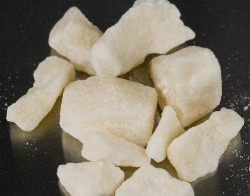Signs Your Loved One is Addicted to Crack
The Watershed Addiction Treatment Programs
The Watershed of the Palm Beaches is licensed by the State of Florida and “Gold Seal” accredited by The Joint Commission for alcohol and drug treatment. This symbolizes value and illumines the dedication to meeting industry performance standards. We are a world-class health care facility that offers professional addiction treatment. Just two miles from beautiful Palm Beach County beaches, our rehabilitation center is the perfect setting to emerge refreshed and renewed.
Read More ›According to the DOJ, “Individuals of all ages use crack cocaine––data reported in the National Household Survey on Drug Abuse indicate that an estimated 6,222,000 U.S. residents aged 12 and older used crack at least once in their lifetime.” And unfortunately, because of the drug’s intense and rapid effects on the mind, it can become addictive even as the result of someone’s first time use.
There are specific signs that will help you indicate whether or not your loved one is addicted to crack. If you notice these in someone you know, seek treatment for them immediately as they will not be able to stop taking the drug on their own.
Signs of a Crack Cocaine High

A crack high may cause paranoia and aggression.
While someone high on crack isn’t necessarily addicted already, an individual who exhibits the signs below chronically is clearly abusing the drug frequently and in large doses. In addition, as stated previously, “a person can become addicted after his or her first time trying crack cocaine” (CESAR).
The signs of a crack high include:
- Fast breathing
- Increased heartbeat
- Dilated pupils
- Euphoria
- Paranoia
- Aggression
- Hyperstimulation
- Increased movement
- Talkativeness
- Anxiety
- Increased temperature
- Increased blood pressure
“The high from crack cocaine begins almost immediately after the vapors are inhaled and lasts about 5 to 15 minutes.” As a result, many users will continue to smoke the drug to try and prolong their high. This is one of the reasons it is so addictive. When someone is commonly displaying these traits, it is likely that they are abusing the drug on a regular basis.
Paraphernalia
Finding crack smoking and other types of drug paraphernalia in an individual’s room or home is a definite sign that they need treatment for crack addiction. According to the DOJ, “glass and metal pipes” can be used to smoke crack, and a picture of these items is available on their website. Crack is also sometimes smoked out of a waterpipe or bong which is often used to smoke other drugs as well. Although some individuals do inject crack, it is less common, but you may notice needles in the person’s living quarters, especially if they are abusing heroin, methamphetamine, or other drugs in addition to crack.
Other Physical Signs of Crack Addiction
Crack often causes respiratory problems because of its main method of abuse, even leading to bleeding of the lungs and other severe issues. According to the NIDA, “Cocaine-related deaths are often a result of cardiac arrest or seizures followed by respiratory arrest.” Abusing crack can often become deadly, especially because it is regularly abused in continuous episodes in order to sustain the high it causes.
Individuals who smoke the drug will likely cough often and experience shortness of breath. The drug also causes gastrointestinal problems, often including nausea, vomiting, and even “severe bowel gangrene” (NIDA). In addition, long-term crack abusers become extremely malnourished. They experience a decreased appetite because the drug suppresses it and then often go for long periods of time without eating much. This can lead to severe weight loss which will be noticeable to others.
The drug also causes sexual dysfunction, infertility, and damage to the reproductive organs in both males and females. According to the NCBI, this is not uncommon as a study from 2007 proved “illicit drug male abusers were prone to have ED, decreased sexual desire, and increased ejaculation latency.” As for female users, sexual desire is also minimized while many women experience an end to their menstruation as their bodies do not have enough weight to support life.
Frequent abuse of crack also causes
- Heart disease and heart attack
- Stroke
- An increased likelihood of contracting HIV, hepatitis B or C, or other dangerous disease (caused by needle sharing and practicing unsafe sex)
Over time, your loved one will begin to need medical care for all the physical issues caused by crack abuse. Those who refuse to stop using the drug in the wake of these problems are already addicted.
Other Behavioral Signs of Crack Addiction
Like most stimulants, the drug causes paranoia, hostility, aggression, irritability, and anxiety during a user’s intoxication. However, over time, these reactions begin to create a psychosis in the individual that mirrors schizophrenia. It can lead to dangerous or risky behavior, violence, homicide, or suicide. Delirium and hallucinations can even occur, including that of “bugs burrowing under the skin,” often called crack bugs (CESAR). When a person starts to display psychotic behavior, they should be treated immediately, and it is important to engage them as little as possible because of the danger they pose to themselves and others.
Crack withdrawal can lead to severe depression which many addicted individuals experience when they cannot obtain more of the drug. This syndrome is also marked by fatigue, incredibly slowed movements, and prolonged amounts of sleep.
Addiction to the drug can occur so quickly that dangerous behavior will seem to increase dramatically. At first, the individual will likely become isolated from their old friends and family members, only wanting to spend time with others who abuse the drug. Then, they might begin to steal, lie, or do other things they would have never done before taking the drug. It is common for someone addicted to crack to become extremely hostile when other individuals ask about their drug abuse or try to help them stop.
When a person becomes addicted to a drug, everything in their life becomes secondary to that substance. They will often stop caring about everything else, including their own health and hygiene, and feel that they need the drug in order to function. As a result, many crack addicts experience
- Job loss
- Grades dropping or failing out of school
- Loss of important relationships
- Financial problems
- Homelessness
- Unwanted pregnancy
- Legal issues
- Prison time
Leading up to these kinds of consequences, there are often many signs to help you realize your loved one is in trouble. But someone who experiences one of the problems listed above as a result of their drug abuse and still refuses to stop smoking crack is severely addicted and won’t stop until they receive help.
